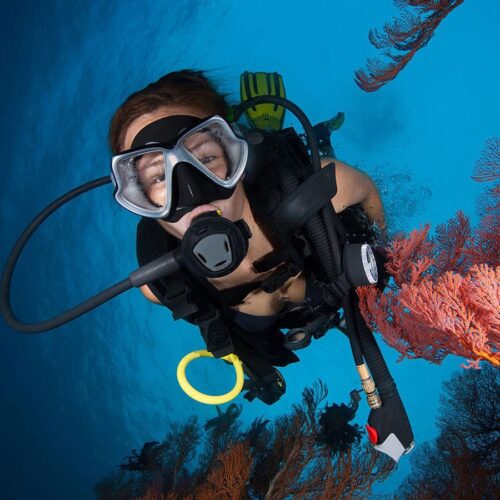Open Water Dive Theory Section 4: Caring for Your Gear and Yourself
Welcome to Section 4 of the Amadive Open Water theory series! You’ve learned the skills in Section 2 and explored the environment in Section 3. Now it’s time to focus on the two most critical factors that determine your safety and comfort: your scuba gear and your own health.
This article will guide you on how to care for your “silent partner” and what you need to know to keep your body in the best condition for diving.

1. A Deeper Look at Your Scuba Gear
Your equipment is your life support system. Caring for it is caring for yourself.
- Care and Maintenance:
- Rinse After Every Dive: Always rinse all your gear thoroughly with fresh water after a saltwater dive to remove salt, sand, and chlorine. This is the single most important step to extend its life.
- Store Properly: Keep your gear in a cool, dry place, away from direct sunlight. Don’t store your BCD or regulator in a way that kinks the hoses.
- Professional Servicing: Your gear (especially your regulator) needs to be serviced annually by a certified technician to ensure it functions perfectly.
- Choosing Gear: When you decide to buy your own equipment, prioritize comfort and fit. A well-fitting mask won’t leak. A properly sized wetsuit will keep you warm effectively.
2. Diver Health and Fitness
Diving is a relaxing activity, but it also requires a good level of physical fitness.
- Importance of Fitness: You don’t need to be an Olympic athlete, but good cardiovascular health helps you handle unexpected situations (like swimming against a strong current) better and use your air more efficiently.
- Things to Avoid:
- Don’t dive when sick: Especially with a cold or congestion. This will prevent you from being able to equalize the pressure in your ears and sinuses.
- Avoid alcohol and drugs: They impair judgment, increase the risk of heat loss, and can contribute to decompression sickness.
- Managing Body Temperature: Hypothermia (getting too cold) is a real risk. Signs include uncontrollable shivering and blue lips or fingernails. If you feel cold, end the dive safely.
3. Pressure-Related Medical Issues
This is an extremely important section of safety knowledge that you must master.
- Decompression Sickness (DCS):
- Cause: When you are deep, your body absorbs nitrogen gas. If you ascend too quickly, the nitrogen doesn’t have enough time to be safely released and can form bubbles in your tissues and bloodstream, causing pain and injury. (Imagine opening a soda bottle slowly versus shaking it and opening it instantly).
- Prevention: Always ascend slowly (no faster than your dive computer allows or slower than your smallest bubbles), perform a safety stop at 5 meters (15 feet) for 3 minutes, and always stay within your no-decompression limits.
- Symptoms: Joint pain, dizziness, skin rashes, paralysis.
- First Aid: Administer 100% oxygen and seek immediate medical attention.
- Nitrogen Narcosis:
- Cause: Occurs at deeper depths (usually below 30 meters/100 feet), where high pressure causes nitrogen to have an anesthetic effect, similar to alcohol intoxication.
- Symptoms: Impaired judgment, feelings of euphoria or anxiety for no reason.
- Solution: Simply ascend to a shallower depth, and the symptoms will disappear on their own.
Conclusion for Section 4
You and your equipment are a team. By taking good care of both, you are creating the safest possible environment for every dive. Understanding your body’s limits and how to prevent pressure-related issues is the mark of a wise diver.
You’re almost at the finish line! Now it’s time to put all this knowledge together.
